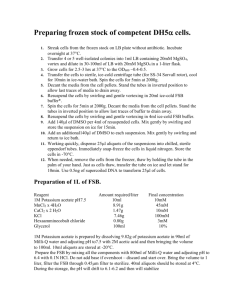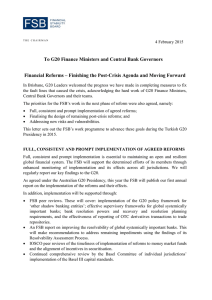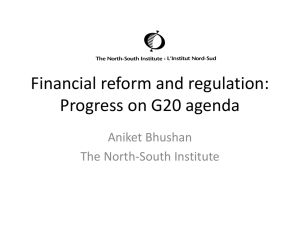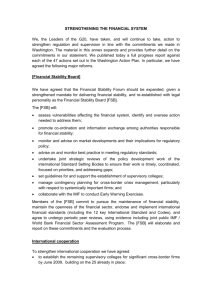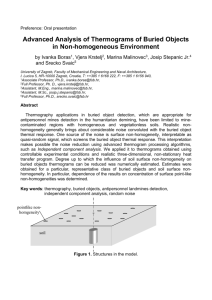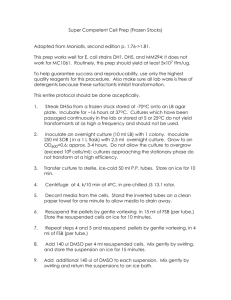letter - Financial Stability Board
advertisement
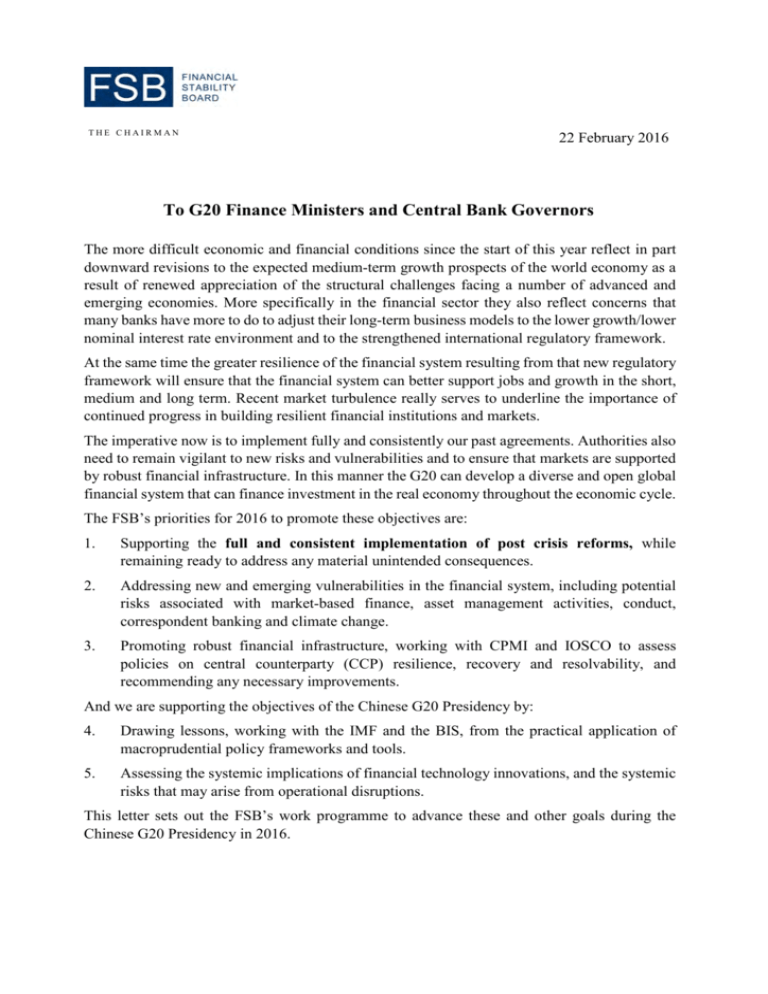
THE CHAIRMAN 22 February 2016 To G20 Finance Ministers and Central Bank Governors The more difficult economic and financial conditions since the start of this year reflect in part downward revisions to the expected medium-term growth prospects of the world economy as a result of renewed appreciation of the structural challenges facing a number of advanced and emerging economies. More specifically in the financial sector they also reflect concerns that many banks have more to do to adjust their long-term business models to the lower growth/lower nominal interest rate environment and to the strengthened international regulatory framework. At the same time the greater resilience of the financial system resulting from that new regulatory framework will ensure that the financial system can better support jobs and growth in the short, medium and long term. Recent market turbulence really serves to underline the importance of continued progress in building resilient financial institutions and markets. The imperative now is to implement fully and consistently our past agreements. Authorities also need to remain vigilant to new risks and vulnerabilities and to ensure that markets are supported by robust financial infrastructure. In this manner the G20 can develop a diverse and open global financial system that can finance investment in the real economy throughout the economic cycle. The FSB’s priorities for 2016 to promote these objectives are: 1. Supporting the full and consistent implementation of post crisis reforms, while remaining ready to address any material unintended consequences. 2. Addressing new and emerging vulnerabilities in the financial system, including potential risks associated with market-based finance, asset management activities, conduct, correspondent banking and climate change. 3. Promoting robust financial infrastructure, working with CPMI and IOSCO to assess policies on central counterparty (CCP) resilience, recovery and resolvability, and recommending any necessary improvements. And we are supporting the objectives of the Chinese G20 Presidency by: 4. Drawing lessons, working with the IMF and the BIS, from the practical application of macroprudential policy frameworks and tools. 5. Assessing the systemic implications of financial technology innovations, and the systemic risks that may arise from operational disruptions. This letter sets out the FSB’s work programme to advance these and other goals during the Chinese G20 Presidency in 2016. 1. FULL AND CONSISTENT IMPLEMENTATION OF AGREED REFORMS The implementation of agreed reforms is essential for achieving financial stability and for building trust in an open global financial system. The FSB is supporting its members by reporting on implementation progress and assessing whether reforms have achieved their intended benefits. Our first annual report to G20 Leaders at Antalya on the implementation and effects of reforms noted that good progress has been made in banking reforms but that there is still some distance to go in other areas. We will continue to highlight to the G20 progress, shortcomings and challenges in implementation, as well as any unintended effects of reforms. The ongoing commitment of Ministers and Governors is needed to ensure that gaps and inconsistencies in implementation are corrected and, where any material unintended impacts have been identified, policies are adjusted. The FSB and the standard setting bodies are working to enhance the analysis of the effects of globally agreed reforms, including whether the reforms are working together as anticipated. This assessment will become more precise as more data is available and implementation advances. The FSB will organise a workshop in May to share experiences in analysing the effects of reforms, including the combined effects and interaction across sectors of related reforms. To prioritise and coordinate implementation monitoring efforts, we are working with other international bodies to develop a ‘heat map’ of resources required for future monitoring work. • By the Hangzhou Summit, the FSB will deliver to Leaders the second annual report on the implementation of the reforms and their effects, including a comprehensive review of whether there has been a reduction in market liquidity and, if so, its extent, drivers and likely persistence. 2. ADDRESSING EMERGING VULNERABILITIES Last year’s report on the implementation and effects of reforms identified three emerging challenges that we are now investigating further: • Developments affecting market liquidity and the role that reforms might have played; • Particular challenges facing emerging market and developing economies; and • Signs of fragmentation in the global financial system. We will report on these issues in this year’s annual report. Risks associated with market-based finance and asset management activities Since the crisis, net credit creation has been largely reliant on market-based debt finance, with emerging markets having tripled annual issuance of international bonds from 2008 to 2015. A sudden stop in provision of market-based finance, if not offset by bank credit, would lead to a pronounced reduction in the supply of credit to the real economy impacting jobs and growth. It would create particular challenges with capital outflows from emerging market and developing economies. The task of authorities is to ensure markets still function well under pressure and that financial systems are not undermined by market illiquidity or become fragmented. 2 Resilient and effective markets require adequate levels of realistically priced liquidity. As part of the FSB’s overall work to assess the extent, drivers and likely persistence of shifts in market liquidity, we have prioritised work to analyse structural vulnerabilities in asset management activities and to identify risks that may merit policy responses in four areas: (i) liquidity mismatch in funds; (ii) leverage within funds; (iii) operational risks in transferring investment mandates; and (iv) securities lending activities of asset managers and funds. An overoptimistic ‘liquidity illusion’ may have been reinforced by the growth of investment products offering redemptions at very short notice. Policies to reduce fire-sale risks in open-ended investment funds may also help to reduce some of the volatility in capital flows. We are analysing vulnerabilities associated with these asset management activities and expect to issue policy recommendations for public consultation before the Hangzhou Summit. Once the above activity-based work is completed, the FSB, jointly with IOSCO, will conduct further analysis and finalise the assessment methodology for asset management under the global systemically important financial institutions (G-SIFI) framework. This analysis will focus on any residual risks once measures to address these activities are taken into account. Under the G20 shadow banking roadmap, the FSB will also evaluate in 2016 the case for developing further policy recommendations to mitigate financial stability risks from shadow banking entities, based on the findings from its information-sharing exercise and peer review. • By the Hangzhou Summit, the FSB will publish a consultative document with its assessment of any structural vulnerabilities associated with asset management activities and policy recommendations to address them. • By your July meeting, the FSB will publish its peer review on implementation of the Framework for Oversight and Regulation of Shadow Banking. Misconduct risks The FSB will continue to work on reducing misconduct risk, including exchanging best practices on governance frameworks and potentially developing a supervisory toolkit or guidance; examining the effectiveness of post crisis reforms to compensation and whether disincentives to misconduct should be strengthened; and sharing national experiences on bank regulators’ enforcement powers. This work will take into account the work of standard-setting bodies, including IOSCO’s ongoing analysis of related issues in securities markets. IOSCO intends to publish by year-end a toolkit of measures to promote proper conduct by market participants, including individuals and firms, in professional markets. • By the Hangzhou Summit, the FSB will report its findings on the role of incentives in preventing misconduct, and progress in addressing issues in fixed income, currency and commodity markets. Correspondent banking We are establishing a coordination group, chaired by Alexander Karrer of the Swiss Ministry of Finance, to implement the four-point action plan sent to the Antalya Summit on further steps to assess and address the decline in correspondent banking: (i) Further examining the dimensions and implications of the issue, through collection of additional information; 3 (ii) Clarifying regulatory expectations to give additional certainty and confidence to those engaged in correspondent banking; (iii) Domestic capacity-building to strengthen customer due diligence and other AML/CFT controls in jurisdictions that are home to affected respondent banks, and the sharing of best practices within the financial industry; and (iv) Strengthening tools for customer due diligence by correspondent and respondent banks. • By the Hangzhou Summit, the FSB will report on progress on its correspondent banking action plan. Disclosure task force on climate-related risks Access to better quality information on climate-related financial risks will allow market participants to better understand and manage these risks. The FSB has established an industryled task force chaired by Michael Bloomberg to develop voluntary, consistent climate-related financial disclosures for use by companies. The task force will conduct public consultation and outreach at each of its stages. • By your April meeting, the task force is expected to publish for consultation its first-stage report, setting out the objectives and scope of its work. • By end-2016, the task force is expected to publish for consultation its recommendations for voluntary disclosure principles and leading practices. 3. STRENGTHENING THE ROBUSTNESS OF FINANCIAL INFRASTRUCTURE Use of central counterparties (CCPs) to clear standardised over-the-counter derivatives transactions is a key element of the G20’s efforts to reduce systemic risks, both by making banks themselves less complex and systemic, as well as by making derivatives markets more robust. At the same time, we must ensure that CCPs themselves are not too-big-to-fail. The work programme of the standard setting bodies and the FSB on CCPs’ resilience, recovery and resolvability published last year provides a clear road map to address too-big-to-fail issues with CCPs. This work will take account of systemic implications of interdependencies between CCPs and major clearing members. Much of this work is expected to be finalised for public consultation in the course of 2016. • By the Hangzhou Summit: o CPMI-IOSCO will issue for public consultation additional granular guidance on CCP resilience and recovery; o the FSB will publish high-level guidance on resolution issues relating to CCPs. • By end-2016, the FSB will issue for public consultation standards or guidance for CCP resolution planning, resolution strategies and resolution tools. 4. DEVELOPING EFFECTIVE MACROPRUDENTIAL POLICIES The Chinese G20 Presidency has called for work to sum up past experiences on macroprudential management and improve the framework of financial regulation coordination, so as to more effectively maintain financial stability. 4 The IMF, FSB and BIS will therefore draw together experiences and lessons on macroprudential policy frameworks and tools. This will assist authorities by informing them of key aspects of macroprudential policy-making, including: processes to analyse systemic risks; toolkits to address a range of vulnerabilities; and domestic and international coordination mechanisms. The joint work could extend to related matters, such as the cross-border dimension of macroprudential policies, including spillover effects, and interactions with other policies. • 5. By the Hangzhou Summit, the IMF, FSB and BIS will deliver to Leaders a review of international experience and lessons with macroprudential policy frameworks and tools. MEASURES TO SUSTAIN RESILIENCE Completion of the capital framework for banks The core of the global financial system — its largest cross-border banks — is considerably stronger today than during prior episodes of market stress. Common equity requirements are seven times the pre-crisis standard for most banks. For global systemically important banks (G-SIBs), they are more than ten times higher. Global standards require banks to hold much higher liquid asset buffers, to strengthen their trading books, and to reduce and simplify the formerly complex web of interbank exposures. In response, banks have built higher and better quality capital buffers, largely through retained earnings, and have reduced leverage. It is expected that the aggregate common equity tier one ratio across all G-SIBs, as calculated on the basis of the fully loaded Basel III requirements, will have been more than 11% at end-2015, approximately double the ratio in 2009. Funding profiles have also improved. Notably for advanced economy G-SIBs, trading activities and interbank lending have been markedly reduced; liquid assets substantially bolstered; short-term wholesale funding cut; and deposit taking increased. With the agreements reached in recent years, including the Basel III framework and the global agreement on Total Loss-Absorbing Capacity, the overall international regulatory and resolution framework for banks is now largely settled. The FSB, the Basel Committee, and authorities will continue to work to provide maximum clarity about the details of the framework, to instil confidence about the stability of overall requirements, and to deliver transparency about the extent to which institutions meet them. While the Basel Committee will address during 2016 elements of the Basel III framework to ensure its coherence and maximise its effectiveness, in doing so authorities are focused on not significantly increasing overall capital requirements across the banking sector. In short, there will be no Basel IV. • By end-2016, the Basel Committee will complete its work to address the excessive variability in risk-weighted assets, while aiming not significantly to increase overall capital requirements. The Basel Committee will also finalise the design and calibration of the leverage ratio in 2016, so that it can be implemented as a Pillar 1 measure by 1 January 2018. Essential work this year to complete elements of agreed reforms will also take place in the following areas: 5 A. Implementation of policies to end too-big-to-fail The FSB delivered to the Antalya Summit the finalised international standard on the total lossabsorbing capacity (TLAC) that globally systemic banks must have. During 2016, work to support resolution planning and TLAC implementation will continue. We are also seeking to broaden industry adherence to the contractual recognition of stays on the close-out of financial contracts when a firm enters resolution, and to finalise the assessment methodology for the FSB’s Key Attributes of Effective Resolution Regimes. The International Association of Insurance Supervisors (IAIS) will finalise in 2016 refinements to its assessment methodology for identifying global systemically important insurers (G-SIIs), and will also issue for public consultation a first draft of its International Capital Standard. • By the Hangzhou Summit, the FSB will deliver to Leaders a progress report on resolution reforms. • By end-2016, the FSB will make its annual update to the list of G-SIIs, using the revised IAIS methodology as a basis. B. Implementation of derivatives markets reforms The recently agreed approach between the US Commodity Futures Trading Commission and the European Commission on margining for CCPs has the potential to remove one of the most significant obstacles to cross-border recognition by the two regulators of their regulatory frameworks. FSB members have also committed to remove legal and regulatory barriers to the reporting of OTC derivatives to trade repositories and facilitate authorities’ access to data by mid-2018. And to improve the quality and consistency of data the FSB is working with CPMI and IOSCO to establish a global Unique Transaction Identifier and Unique Product Identifier. • By end-June 2016, FSB member jurisdictions will report to the FSB their plans to meet their commitments to remove legal and regulatory barriers to the reporting of OTC derivatives to trade repositories and facilitate authorities’ access to data by mid-2018. 6. IMPLICATIONS OF FINANCIAL TECHNOLOGY INNOVATIONS A number of technological innovations with potentially transformative implications for the financial system, its intermediaries and users are now receiving close attention. The regulatory framework must ensure that it is able to manage any systemic risks that may arise from technological change without stifling innovation. The FSB is evaluating the potential financial stability implications of emerging financial technology innovation for the financial system as a whole, working with standard setters that are monitoring developments in their respective sectors. We are also working to understand better the potential impacts on financial stability of operational disruption to core financial institutions or infrastructure. The FSB will discuss the findings at its March Plenary meeting and consider next steps. The FSB’s work in this area may help to support the work of the G20 on Innovation and the Digital Economy. • By your April meeting, the FSB will report on issues for authorities and planned next steps in this area. 6 IN CONCLUSION The G20 has worked intensively over the past seven years to fix the fault lines that led to the Global Financial Crisis. Durable success will require sustained efforts to implement fully the G20’s agreed reforms; to monitor their effects on growth; to maintain constant vigilance to new and evolving risks; and to deepen the FSB’s open and cooperative approach. In these ways, the FSB can fully support the G20’s efforts to build a resilient, open and trusted financial system that will support strong, sustainable and balanced growth for all countries. Yours sincerely Mark Carney 7

